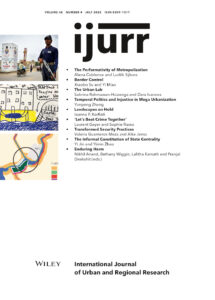As part of China’s endeavour to modernize and internationalize its cities, it has repeatedly eliminated street markets and street vendors. But in the (post-)pandemic context, regulating street businesses inclusively turned out to be an efficient way to generate jobs that has been widely promoted. This turn reveals a new pattern in China’s urban governance that might contribute to rethinking the state–informality nexus. In this article we draw on observations and interviews in Chengdu and on critical discourse analyses of related government documents and news reports to suggest that there is an underlying logic of control that governs the state’s new tactics for regulating street businesses. We examine three tactics—performative tactics of regulation, spatial tactics of control and temporal tactics of contingency—to uncover the state’s centrality and the tactics it uses to consolidate such centrality in the name of informality. Regarding informality and state centrality as conditions for each other allows us to interrogate both the internal logic of control and its manifestations in everyday statehood. Within the informal constitution of state centrality, everyday negotiations and contestations of spatial claims eventually render the ‘ordinary state’ a hegemonic locus that shapes urban experiences and politics.
Details
Written by:
Yi Jin & Yimin Zhao
Digital Object Identifier (DOI)
10.1111/1468-2427.13124
About DOI

